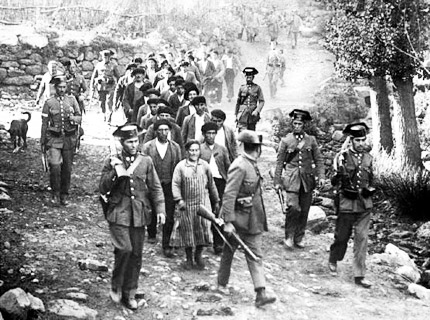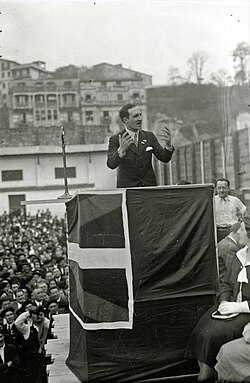Hi Comisario! I diligently followed your TL since its first chapter but always held back from posting since I had nothing constructive to offer to the discussion. Really a great work: even if we're just into its second year I foresee only good things for this story!
But since 1939 gets closer and closer and some AH.commers already started talking about Spain's role in alt-WW2 a weird concept suddenly popped up in my thoughts: could this world be spared from a second World War? In other words, could it be that the great conflict the Nazis will inevitably start (German economy couldn't sustain peace time much longer in 1939) will be a one-front struggle against the Soviet/Slav giant in the East, so being remembered as the last Great European War but not as a World War?
When Hitler invaded France IOTL, the latter was the last non-Fascist continental power in Western Europe, leaving "only" the UK to deal with, but ITTL the Iberian peninsula will be in the hands of a virulently anti-Fascist republic that has just finished showing to the world the prowess in battle of its citizens in a long, bloody civil war. TTL Hitler will know that the Communist Spanish won't be friendly neighbours (like OTL Franco-ist Spain was) to an occupied/puppetised French state but will also know that an invasion of Iberia isn't going to be a stroll in the park like the fall of France ("Let's build only one half of the Maginot Line! It'll be more than enough.") since Germany and Italy were recently burned by the failure of their Falangist allies to seize power, even with all the supplies they sent them and the military expertise they provided. And we shouldn't forget that a long, expensive campaign and occupation in the West is just what Stalin needs to take his plan of full-modernisation of the Red Army by 1942 to its full achievement. In Dr. Strangelove's NSCW timeline the two front war was a possibility because the military capabilities of the Second Spanish Republic were unexplored territory for the Axis, due to the lack of the Civil War; here Germans and Italians have fought against the Spanish Soviet-supplied war machine and they have lost!
IOTL the Molotov-Ribbentrop Pact meant the end to any chance of trying to bring Pilsudski's Poland in the Axis camp (and the Fascists really tried to accomplish this feat, because of the Russians being perceived as the greater danger in Warsaw too), since that nation would have formally ceased to exist after the invasion, resulting in Germany and the Soviet Union sharing a common border. But in a scenario with an aborted Western front we could actually see Poland obtaining full membership in the Anti-Comintern Pact and declaring war to the Eastern Colossus. After all, who would come to its rescue in any substantial way? Not the French,who would never risk a naked aggression to the Third Reich without an unshakable war alliance with the British Empire, which is presumably governed by Neville Chamberlain, a man whose strategy of looking the other way while Hitler annexed more and more land was finalised at making Hitler's oncoming war a showdown of Fascism against Communism, which should have resulted in the crippling or outright disappearance of one or even both blocs in the fires of the conflict, without spilling a single drop of British blood (and a Communist takeover of Spain won't do anything to paint the Soviet Union as a nation deserving military help. Spain could and would help the Soviets but it lacks almost anything it'd need for proper power projection at the other end of Europe.
Or maybe it's just me that's abusing the scope of the butterfly effect, but it would be funny to see the most important event in XX century history and the pivotal moment in the history of many nations being warped into a "dark grey vs. black" showdown between two evil empires.


